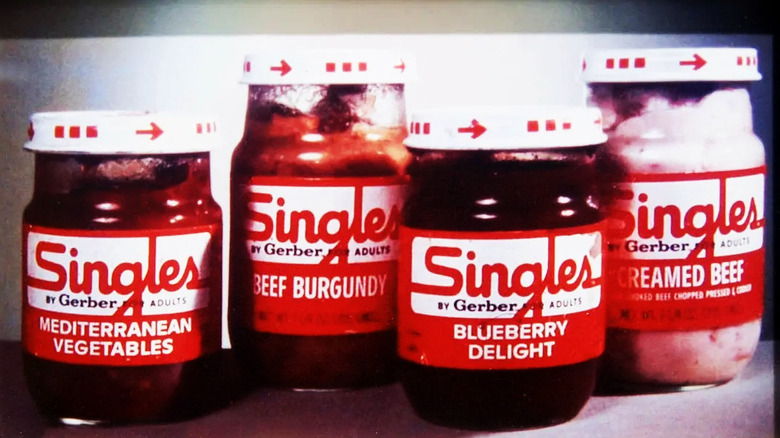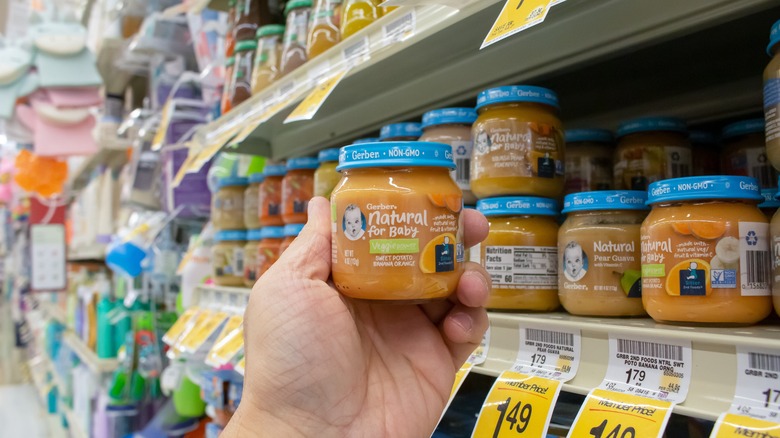The (Failed) Time When Gerber Made Baby Food For Adults
Certain brands are synonymous with a specific type of product, and they are engrained in our consumer minds that way. If Purina started marketing a kibble for humans, it would likely be met with ridicule, not success (unless maybe it found an audience as a novelty gag item — pour milk on it, and it's a breakfast cereal!). The Gerber company, renowned for its baby food, once tried to market pureed jarred entrees for adults, and the effort was just about as successful as "human dog food" would likely be.
Singles by Gerber was unveiled in 1974 and presented in small glass jars that looked very much like the company's containers of baby food. The reason they seemed so similar? Because they were, in fact, the same jars produced on the exact same assembly lines. The contents of said jars — also very much like the brand's offerings for infants — were blended-up dishes with names like "Beef Burgundy," "Mediterranean Vegetables," "Ham Casserole," "Creamed Beef," and even "Sweet and Sour Pork."
The marketing for this adult food line was rather self-defeating, targeting the rising number of post-Baby Boom unmarried adults with melancholy or condescending taglines like "Something to eat when you're alone" and "Look at you! All grown up!" The imagery of being a rather sad meal option for lonely people and equating the product to the mushy fare the adults ate as infants didn't help the product gain popularity — neither did the complete lack of visual and textural differentiation from Gerber's bread and butter, its baby food.
Gerber was trying to address a changing marketplace
In launching its Singles line, Gerber was reacting to changing realities in its target market. The Baby Boom, which had spurred millions of births between 1946 and 1964, was in the rearview. Marriage and birth statistics were down significantly from what they had been in previous years — more people were staying single, and fewer people were having children in the 1970s. This was all bad news for a company that made its money off parents with growing families.
For Gerber to try and pivot was a natural step. For such a big company to try and do it as cheaply and efficiently as possible by using what it already had was also a natural step. Utilizing existing manufacturing processes and packaging was a practical move, but it certainly wasn't well thought out from a consumer's perspective.
Pureed food might have been a great option for elderly nursing home patients with specific dietary needs, but it was certainly not a product that would appeal to the young, hip crowd of single adults Gerber was targeting. Ultimately, it was a missed opportunity for Gerber to potentially break successfully into a burgeoning market.
Gerber's adult food idea was conceptually sound but poorly executed
In the end, it was execution, not the concept, that spelled the downfall of Gerber Singles. The trends of the day did open up a strong marketplace for peddling easy meals to busy single adults. While TV dinners eventually fell out of popularity — and there are various discontinued frozen entrees we'll probably never taste again — the market for them was strong and competitive in the '70s, and trend indicators showed that providing quick food options for working adults was a profitable idea.
But to say that grownups weren't interested in eating their own version of baby food would be very accurate. Within only three months of its launch, Singles was pulled from grocery store shelves and sent back to Gerber.
If you're sad you never got to try this adult version of baby food, you can, of course, always purchase some of Gerber's currently made jars of baby products. The Singles were, reportedly, not much different in taste or composition. You can also easily prepare your own adult pureed dinners with the old-fashioned kitchen gadget Ina Garten always has on hand, a food mill, which mothers have been using for generations to make homemade baby food. But, most likely, just as with consumers in the 1970s, the idea of eating a savory dinner milkshake at room temperature doesn't hold any more appeal today than it did back then.



